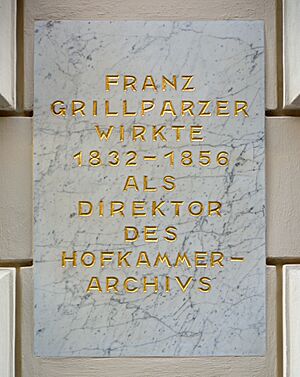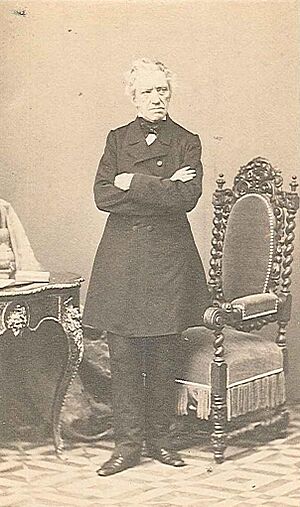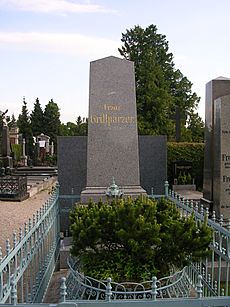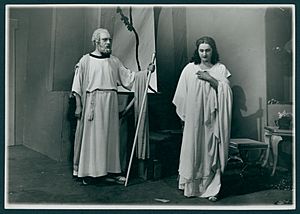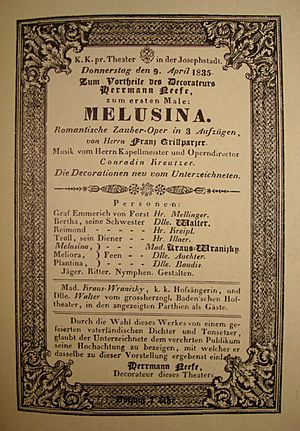Franz Grillparzer facts for kids
Quick facts for kids
Franz Grillparzer
|
|
|---|---|
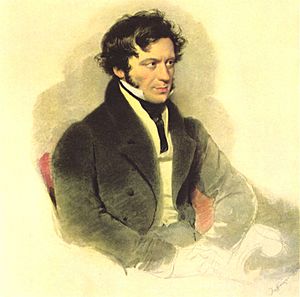
Portrait of Franz Grillparzer, by Moritz Michael Daffinger, 1827
|
|
| Born | 15 January 1791 Vienna, Austria |
| Died | January 21, 1872 (aged 81) Vienna, Austria |
| Resting place | Hietzing Cemetery |
| Occupation | Dramatist |
| Language | Austrian German |
| Nationality | Austrian |
| Alma mater | University of Vienna |
| Period | 1817 – 1872 |
| Notable works |
|
| Signature | |
Franz Seraphicus Grillparzer (born January 15, 1791 – died January 21, 1872) was a very important Austrian writer. Many people consider him the best Austrian playwright (someone who writes plays) of the 1800s. His plays were, and still are, often performed at the famous Burgtheater in Vienna.
Grillparzer also wrote a speech for the funeral of the famous composer Ludwig van Beethoven. He even wrote the words for the tombstone of his friend, the composer Franz Schubert. Even though he wrote during a time called Romanticism, his writing style was more like the earlier period of Classicism. He believed in beauty and good values. His plays often explored spiritual ideas rather than focusing on everyday life. After World War II, his works helped shape Austria's identity, and he became known as the country's national poet.
Contents
Franz Grillparzer's Life Story
Early Life and Family Background
Franz Grillparzer was born in Vienna, Austria. His father, E. J. Grillparzer, was a lawyer who believed strongly in the liberal ideas of Emperor Joseph II. However, his father was not very successful, and his family lost money because of the Napoleonic Wars. Franz's mother, Anna Franziska, was a nervous person. She came from a well-known family in Vienna.
Education and Career Path
Franz's father wanted him to become a lawyer. So, in 1807, Franz started studying law at the University of Vienna. Two years later, his father passed away, which made things difficult for the family. After finishing his degree in 1811, Franz worked as a private teacher for a noble family. In 1813, he joined the government as a clerk in the Imperial Hofkammer (which was like the country's treasury).
Later, in 1832, he became the director of the archives (where important historical documents are kept) at the Imperial Hofkammer. He stayed in this job until he retired in 1856. Grillparzer didn't really enjoy his government job. He saw it mostly as a way to earn money and be independent.
His Writing Journey and Influences
From a young age, Franz loved to write. He was especially interested in Spanish plays, and many of his own works show the influence of writers like Pedro Calderòn de la Barca. In 1853, he wrote about his own life up to 1836. After he died, many of his notes on literature, philosophy, and politics were found. These notes showed he had a strong and independent mind.
He didn't like the ideas of the philosopher Georg Wilhelm Friedrich Hegel because he found them hard to understand. But he carefully studied the works of Immanuel Kant. Grillparzer believed that you couldn't teach someone to write poetry, but he also thought that a poet needed to fully understand their topic before writing. This meant he worked hard to research the time periods he wanted to write about in his plays.
Personal Life and Later Recognition
Grillparzer was a quiet person who preferred to think and observe. He never got married. To strangers, he might have seemed cold, but with friends, he was lively and engaging. He loved to travel and visited many European countries.
After 1840, his only comedy was not well-received by the public. For a while, people almost forgot about him. Luckily, in 1849, his admirer Heinrich Laube became the artistic director of Vienna's court theater. Laube brought Grillparzer's older plays back to the stage, and they became very popular. To his surprise, Grillparzer became a celebrated author, compared to famous writers like Johann Wolfgang von Goethe and Friedrich Schiller.
On his 80th birthday, everyone in Vienna, from the royal court to ordinary citizens, honored him. When he passed away in Vienna on January 21, 1872, the whole country mourned him. He was buried with great ceremony.
Grillparzer's Important Plays
Early Works and The Ancestress
Between 1807 and 1809, Grillparzer wrote a long tragedy called Blanca von Castilien. He also wrote parts of other plays like Spartacus and Alfred der Grosse.
When Grillparzer started writing, German theater was popular for "fate-tragedies." These plays often involved dark themes and characters whose lives were controlled by fate. Grillparzer's play The Ancestress (German: Die Ahnfrau), published in 1816, was one of these. It tells the story of a ghost who must wander until her family line ends, with lots of dramatic and scary scenes. This play made Grillparzer famous in 1817.
Sappho and The Golden Fleece
After The Ancestress, Grillparzer wrote Sappho (1818). This play was very different. It explored the challenges of being a talented poet, showing how a poet might have to give up personal happiness for their art. After reading an Italian version of Sappho, the famous poet Lord Byron believed that Grillparzer would be remembered for a long time.
In 1821, Grillparzer finished his trilogy (a series of three plays) called The Golden Fleece. This project was paused when his mother died in 1819. The trilogy starts with a short play, Der Gastfreund, then shows Jason's adventures in The Argonauts. The final play, Medea, tells the famous story of Medea. Like Sappho, this trilogy explores the conflict between a simple, happy life and the powerful forces of genius or ambition. Many critics believe Medea is one of Grillparzer's greatest achievements.
Historical Tragedies and Personal Struggles
Grillparzer wrote a historical tragedy called King Ottokar's Fortune and End (German: König Ottokars Glück und Ende). It was written in 1823 but performed in 1825 due to issues with the censor. This play was about the conflict between Ottokar II of Bohemia and Rudolph I of Germany. It was very popular in Vienna because it showed an important time in Austrian history: the start of the House of Habsburg.
Another historical tragedy, A faithful Servant of his Lord (Ein treuer Diener seines Herrn), written in 1826, explored the idea of extreme loyalty. However, this play was not well-received by the public or the court.
These historical plays marked a difficult time for Grillparzer. He faced problems with Austrian censors, which was hard for his sensitive nature, especially since he worked for the government. In 1826, he visited Johann Wolfgang von Goethe and saw how much more freedom writers had in Weimar compared to Vienna.
He also faced personal sadness. In 1820, he fell in love with Katharina Fröhlich, but he decided not to marry, perhaps feeling that happiness was not meant for him. This caused him great sadness, which he wrote about in his poems called Tristia ex Ponto (1835).
Later Masterpieces and a Comedy Setback
Despite his troubles, Grillparzer wrote two more great plays during this time: Waves of the Sea and of Love (German: Des Meeres und der Liebe Wellen, 1831) and The Dream, a Life (Der Traum ein Leben, 1834). Waves of the Sea and of Love tells the story of Hero and Leander as a tragic love story.
The Dream, a Life is considered his most technically skilled play. It is influenced by Spanish drama and shows the dreams of a young peasant named Rustan. Rustan wakes up from a nightmare to realize that earthly ambitions are not truly important. Instead, true happiness comes from being content with what you have and finding inner peace. This was Grillparzer's first play that did not end sadly.
In 1838, Grillparzer wrote his only comedy, Woe to him who lies (German: Weh dem, der lügt). This play was unique because its hero succeeded by always telling the truth, even when his enemies expected him to lie. However, the play was not popular at its first performance on March 6, 1838. This failure deeply affected Grillparzer, and he stopped writing for the German theater for a long time.
Final Works and Lasting Legacy
After the failure of Woe to him who lies, Grillparzer didn't publish any more plays, except for a beautiful unfinished work called Esther (1861). However, after his death, three completed tragedies were found among his papers. These included The Jewess of Toledo (Die Jüdin von Toledo, written in 1851), which is now a classic German play. Also found were Ein Bruderzwist in Habsburg (a powerful historical tragedy) and Libussa, which is considered one of his deepest and most mature plays. These later works show how much was lost when he stopped writing for the theater.
What Made Grillparzer Special?
Grillparzer was a very important person in Viennese theater in the 1840s. Many of his best plays were created during the time of Romanticism, but his works don't quite fit into that category. His language and characters often reflect an older style called Neoclassicism. For example, in plays like Sappho and Das goldene Vlies, he uses classical themes and stories. A key idea in his time was that beauty and goodness were connected.
In his historical plays, like King Ottokar's Fortune and End, he showed an optimistic belief from the Age of Enlightenment. This belief was that people could organize their lives and create a time of peace and harmony. This idea was common in Austrian thinking during that period, possibly reflecting their diverse country. For instance, the play features Ottokar, a 13th-century Bohemian king who wants to conquer his neighbors, which was a subtle reference to Napoleon, who had recently been defeated. However, the play ends on a hopeful note.
Even though Grillparzer was mainly a playwright, his poems were also very personal and intense. In his later years, he wrote sharp and witty sayings about many of his famous friends and rivals. As a prose writer, he wrote a powerful short story called Der arme Spielmann (1848). He also wrote a book of critical studies on Spanish drama, showing how well he understood that style of writing.
Grillparzer had a thoughtful, sometimes sad personality. He lacked strong willpower and often felt pessimistic. The difficulties he faced made him feel bitter. Because of these traits, he was able to perfectly express the mood of Austria during a time when intellectual freedom was limited, between the Napoleonic Wars and the Revolutions of 1848.
Works by Franz Grillparzer
Plays
- Blanka von Kastilien (Blanche of Castile, 1807–09)
- Spartakus (Spartacus, 1809)
- Alfred der Große (Alfred the Great, 1809)
- Die Ahnfrau (The Ancestress, 1817)
- Sappho (1818)
- The Golden Fleece (1821), a trilogy including:
- Der Gastfreund
- Die Argonauten
- Medea
- Melusina (1822–23)
- König Ottokars Glück und Ende (The Fortune and Fall of King Ottokar, 1823)
- Ein treuer Diener seines Herrn (A Faithful Servant of his Lord, 1826)
- Des Meeres und der Liebe Wellen (Waves of the Sea and of Love, 1831)
- A Dream is Life (1834)
- Tristia ex Ponto (1835)
- Weh dem, der lügt (Woe to him who lies, 1838)
- Libussa (1848)
- Ein Bruderzwist im Hause Habsburg (Family Strife in Hapsburg, 1848)
- Die Jüdin von Toledo (The Jewess of Toledo, 1851)
- Esther (an unfinished play, 1861)
Short Stories
- Das Kloster bei Sendomir (The Monastery at Sendomir, 1827)
- Der arme Spielmann (The Poor Musician, 1848)
See also
 In Spanish: Franz Grillparzer para niños
In Spanish: Franz Grillparzer para niños
- List of Austrian writers
- List of Austrians
- Jenny Weleminsky, who translated Sappho and some of Grillparzer's poems into Esperanto


